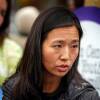As Boston Mayor Michelle Wu noted in her remarks Wednesday, it's been three years since the last in-person State of the City address by a Boston mayor — and that one was delivered by former Mayor Marty Walsh, before the pandemic wrought a massive change in the rhythms of everyday life. Wu, for her part, has never given a speech quite like this one.
So what stood out this time? Here are a few points of emphasis, conspicuous omissions, and nagging questions worth pondering.
1. Populism is a Wu touchstone — and a political strength.
Wu kicked off her remarks by recounting her first snowstorm as mayor, which occurred a year ago this week, and then paying tribute to the city workers who respond when winter weather hits and in countless other situations. "Our city is carried by so many people whose faces most of us never see," Wu said. To drive the point home, those same city workers were highlighted in a video that rolled before Wu's speech, as well as in portraits hung at the entrance to new MGM Music Hall.
Wu's determination to foreground these men and women may be linked. in part, to her own experience of feeling invisible the first time she stepped into Boston City Hall, something she discussed in detail in her aforementioned inaugural address. It’s also smart politics, since those same employees make up an electoral base that’s guaranteed reelection to any incumbent Boston mayor who’s wanted it for decades.
2. Development in Boston is about to be revolutionized.
When Wu, as a city councilor, released a detailed blueprint for abolishing the Boston Planning and Development Authority back in 2019, her plan seemed almost implausibly ambitious — not because it was poorly thought out (quite the contrary), but because the BPDA was such an entrenched part of Boston's civic fabric and so much would have to happen for Wu's vision to become a reality. Today, the picture looks very different — and in her remarks Wednesday, Wu said that over the course of 2023, she'll shift planning from the BPDA to a new City Planning and Design Department, while moving the BPDA’s compliance and enforcement functions to the Office of Housing. It may not be total abolition, at least yet, but it’s a credible start.
Also on Wu's 2023 to-do list: revamping the city’s notoriously confusing zoning code and development-review process; formally renouncing Boston’s urban-renewal authority, which enabled the destruction of neighborhoods like the old West End; and rolling out a rent-control proposal aimed at capping rent increases and preventing displacement. Oh, yeah — she also announced that the city is willing to give away land, for free, to developers able and willing to construct high-quality, affordable housing.
In isolation, any of these developments would be big news. Collectively, they suggest that the city's development status quo is about to be subjected to a veritable earthquake, for better or worse — even though the fate of Boston’s rent control at the State House is uncertain at best.
3. Police reform is too hot a topic to mention.
When Wu faced off against then-Boston City Councilor Annissa Essaibi George in the 2021 mayoral final, she was clearly the candidate with the bolder vision for reforming the Boston Police Department. But you’d never know that from Wu's remarks Wednesday. Maybe she steered clear of the subject due to an ongoing impasse in contract negotiations, to avoid inflaming an already delicate situation — or maybe that same impasse has changed Wu’s sense of what’s possible when it comes to reforming the BPD. Either way, it was a conspicuous omission.
4. Is Boston still a Green New Deal city?
Wu’s penchant for pre-mayoral planning included the environment as well. Her 2020 Plan for a Boston Green New Deal and Just Recovery (from COVID-19) ran nearly 50 pages long, and ultimately helped make Wu the preferred candidate of the climate-focused activists, many of them young, who also helped U.S. Sen. Ed Markey fend off a primary challenge from then-Rep. Joe Kennedy that same year. The Boston Green New Deal didn't vanish in Wu’s first-ever State of the City, exactly — there were plenty of references to environmentally focused achievements and initiatives — but the phrase itself was nowhere to be found in the text of her speech.
As with the police-reform omission, it’s impossible to know why without having been a part of the mayor’s pre-speech prep. But it’s worth noting that the “Green New Deal” moniker creates big expectations from people who want massive transformation quickly, while also inviting caricatured criticism from people who think climate change is a bogus pretext for more government control. Jettisoning that branding, while remaining focused on the same underlying issues, may be in Wu’s own best long-term interest.
5. Wu’s plans for improving BPS remain hazy.
As the mayor noted Wednesday, she’s deeply invested in the quality of the Boston Public Schools, since her own children are students. But while Wu included fending off a state takeover of BPS in her list of 2022 achievements, she provided less clarity than some BPS families might have desired on the question of how, exactly, to make the schools better when it comes to educational outcomes for all students.
Several intriguing ideas were floated by the mayor, including better facilities, more money for inclusion, a new Year 13 program at Fenway High, and new Office of Youth Engagement and Advancement. But is that really enough to realize Wu’s lofty goal of “academic excellence across all our schools, accessible to all our students”? If not, the mayor may find herself wishing in a few years that that state takeover — which was floated due to damning data about the educations BPS students actually receive — had succeeded after all.
Watch the State of the City address:








